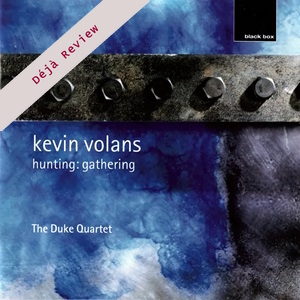
Déjà Review: this review was first published in December 2002 and the recording is still available.
Kevin Volans (b. 1949)
String Quartet No 1 ‘White Man Sleeps’ (1982)
String Quartet No 2 ‘Hunting: gathering’ (1987)
String Quartet No 6 (2000)
Duke Quartet
rec. 2001, Winterbrook Studios, London. DDD
Black Box BBM1069 [73]
The South African-born composer Kevin Volans came to string quartet writing relatively late, completing his Quartet No 1 in 1982. The title, ‘White Man Sleeps’, reveals his African origins, as does the title ‘Hunting: gathering’ of the Quartet No 2, composed five years later. By 2000 he had moved on to his Sixth Quartet. These three pieces comprise the repertoire collected here, and an entertaining and satisfying disc it makes.
First of all, the Black Box recordings are excellent, made at the Winterbrook Studios in London. Perspectives are accurate, ensembles are crisp, sonorities are rich. The Duke Quartet play with discipline and commitment. But what of the music, which to most listeners will be an unknown quantity.
Volans possesses a sure technique, sufficient to allow him to generate African traditions and conventions through the medium of a Western quartet. In a detailed insert note he writes: ‘By introducing some strictly non-Western aspects of African music into the European concert repertoire, I hoped to gently set up an African colonisation of Western music and thus preserve some unique qualities, albeit in a new form.’ Those last words are important, for these pieces (ie. the first two quartets) are not arrangements, but rather fresh compositions which take inspiration from ethnic music.
Volans provides a detailed explanation of his sources of inspiration, including the reworking of his existing ideas for the quartet medium. In this he has been particularly successful, particularly imaginative. There is a good balance of the static and the dynamic, and the instrumental combinations and sonorities make for compelling listening. Whether Volans achieves all the ambitious intentions he outlines in the notes will probably only be known to seasoned listeners who have heard or studied the music thoroughly over many hearings. But whatever the case, there is no lack of urgency, no lack of inspiration. The sources may be genuinely African, but the Western string quartet proves more than capable of breathing vibrant life into the music.
The later Quartet No 6 (2000) is more abstract, and is unusual in requiring either two string quartets or one plus a pre-recorded tape, the option featured here. Again, Volans includes a quite detailed introduction to the music, with ideas flying around in all directions. The music is a little like that too, eschewing a programmatic approach. He complains that at 26 minutes, the piece is not as long as he wanted it to be. But more doesn’t mean better, and from the listener’s point of view it works well enough as it is.
Terry Barfoot
Buying this recording via a link below generates revenue for MWI and helps us keep free access to the site



















